人教版(2019)必修第二册 Unit 1 Cultural Heritage Discovering Useful Structure 课件(共38张PPT)
文档属性
| 名称 | 人教版(2019)必修第二册 Unit 1 Cultural Heritage Discovering Useful Structure 课件(共38张PPT) | 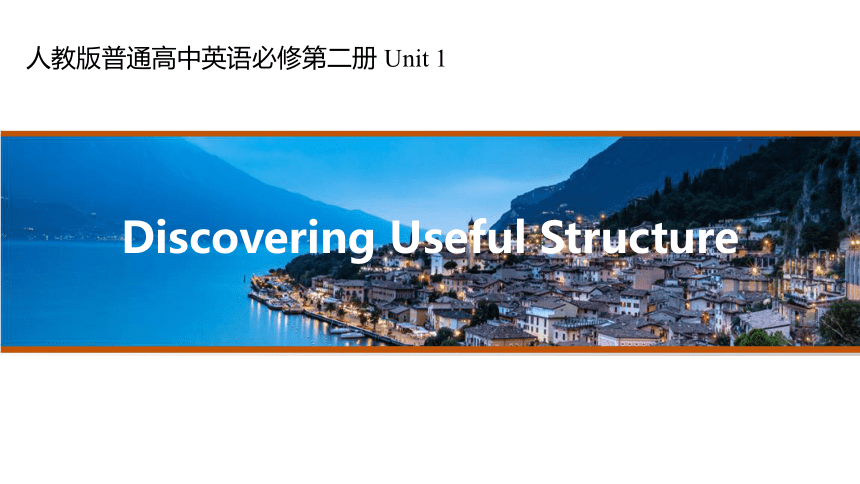 | |
| 格式 | pptx | ||
| 文件大小 | 11.3MB | ||
| 资源类型 | 教案 | ||
| 版本资源 | 人教版(2019) | ||
| 科目 | 英语 | ||
| 更新时间 | 2024-09-19 12:57:13 | ||
图片预览

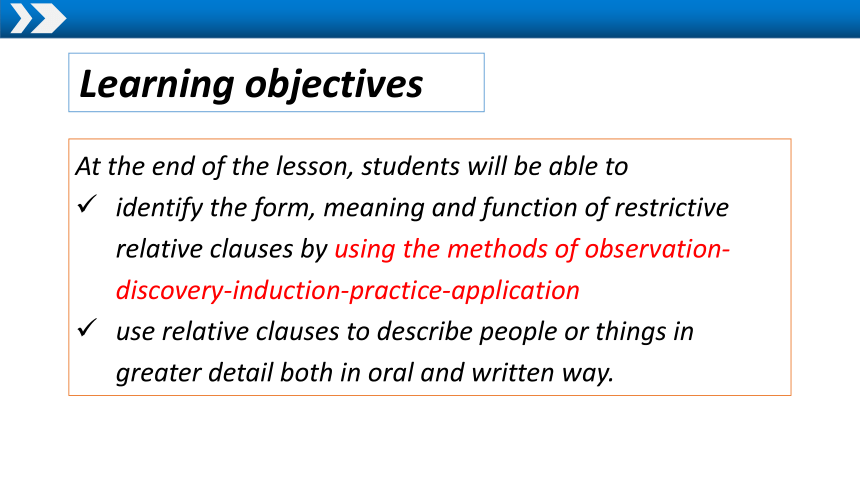
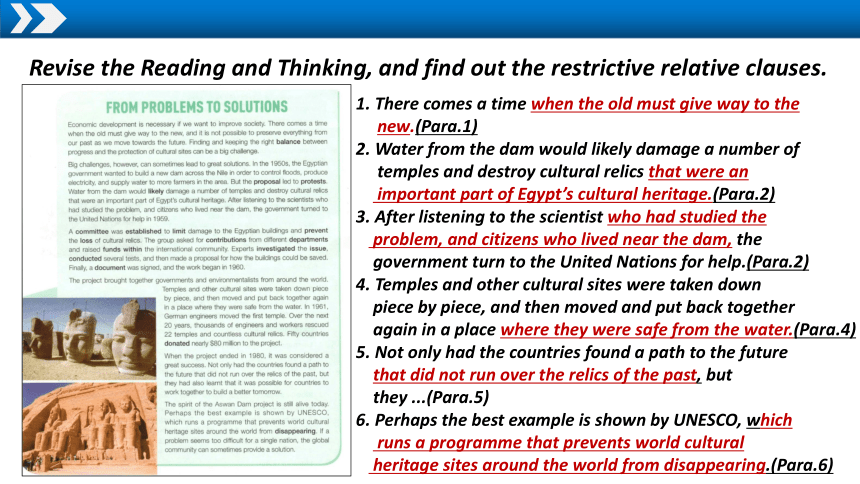
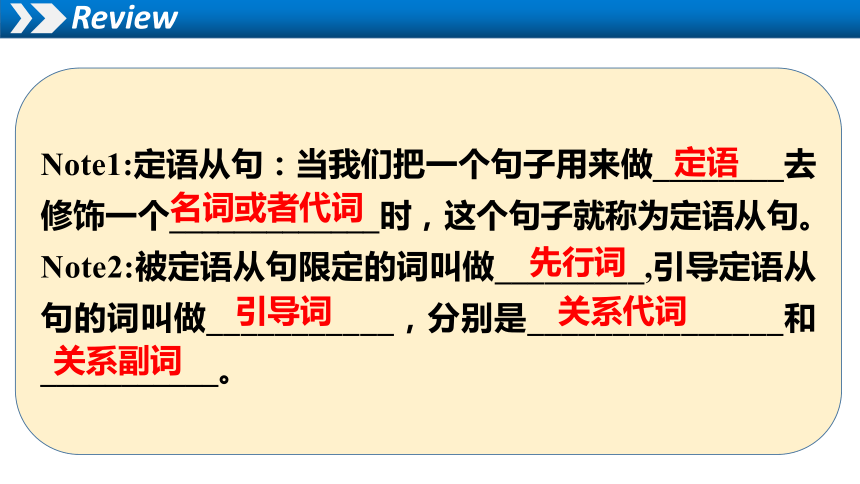
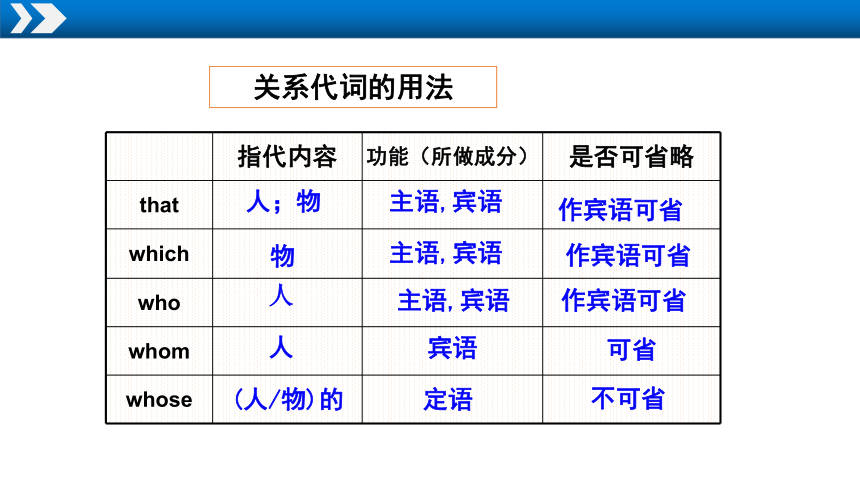
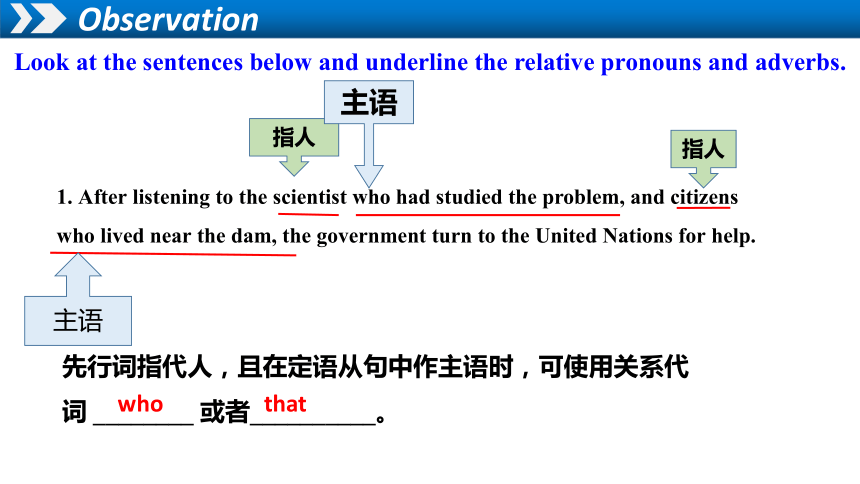
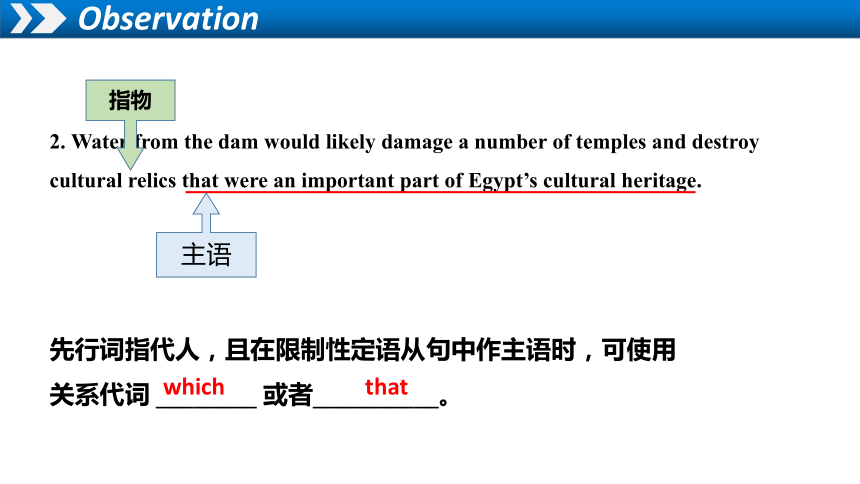
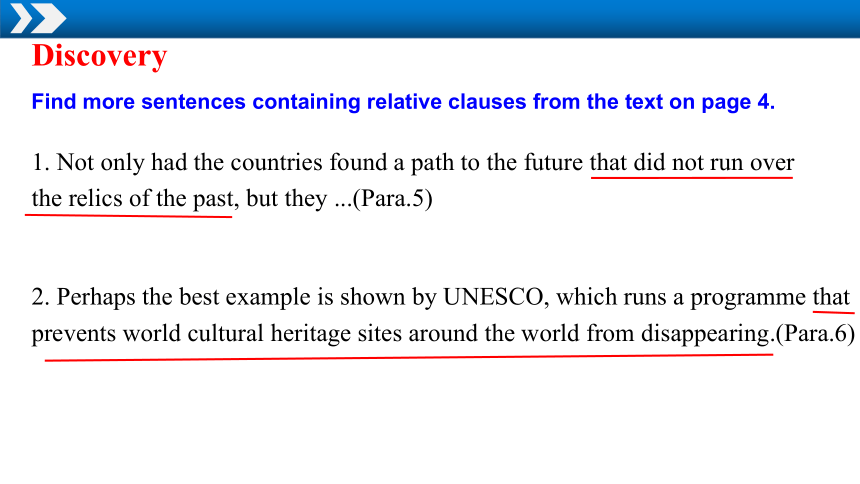
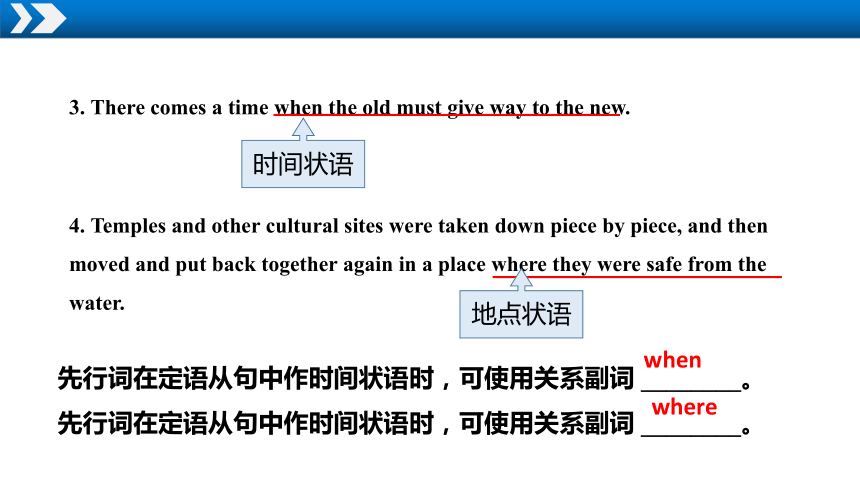
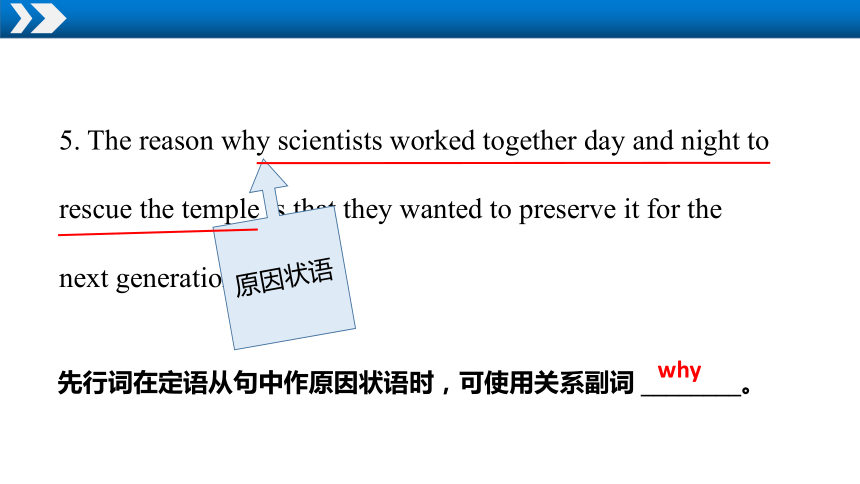
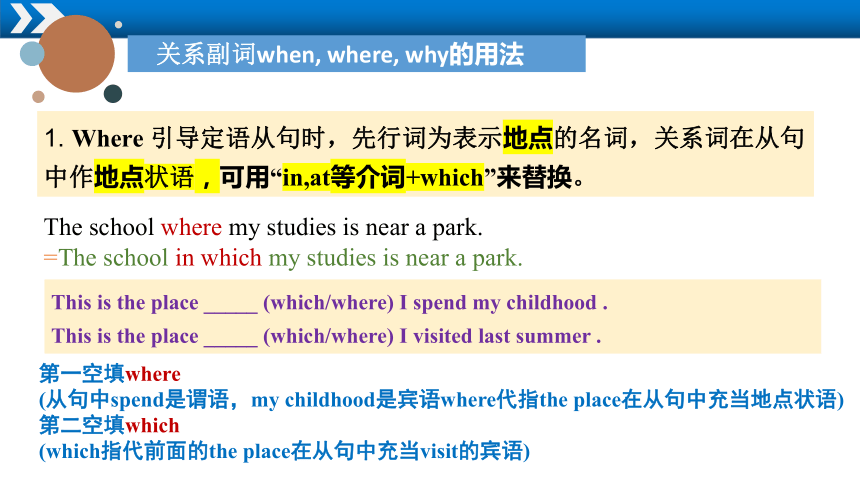

文档简介
(共38张PPT)
人教版普通高中英语必修第二册 Unit 1
Discovering Useful Structure
At the end of the lesson, students will be able to
identify the form, meaning and function of restrictive relative clauses by using the methods of observation-discovery-induction-practice-application
use relative clauses to describe people or things in greater detail both in oral and written way.
Learning objectives
Revise the Reading and Thinking, and find out the restrictive relative clauses.
1. There comes a time when the old must give way to the
new.(Para.1)
2. Water from the dam would likely damage a number of
temples and destroy cultural relics that were an
important part of Egypt’s cultural heritage.(Para.2)
3. After listening to the scientist who had studied the
problem, and citizens who lived near the dam, the
government turn to the United Nations for help.(Para.2)
4. Temples and other cultural sites were taken down
piece by piece, and then moved and put back together
again in a place where they were safe from the water.(Para.4)
5. Not only had the countries found a path to the future
that did not run over the relics of the past, but
they ...(Para.5)
6. Perhaps the best example is shown by UNESCO, which
runs a programme that prevents world cultural
heritage sites around the world from disappearing.(Para.6)
Note1:定语从句:当我们把一个句子用来做________去修饰一个_____________时,这个句子就称为定语从句。
Note2:被定语从句限定的词叫做_________,引导定语从句的词叫做___________,分别是_______________和___________。
定语
名词或者代词
先行词
引导词
关系代词
关系副词
Review
指代内容 功能(所做成分) 是否可省略
that
which
who
whom
whose
关系代词的用法
人;物
物
人
人
(人/物)的
主语,宾语
主语,宾语
主语,宾语
宾语
定语
作宾语可省
作宾语可省
作宾语可省
可省
不可省
1. After listening to the scientist who had studied the problem, and citizens who lived near the dam, the government turn to the United Nations for help.
指人
指人
主语
主语
先行词指代人,且在定语从句中作主语时,可使用关系代词 ________ 或者__________。
who
that
Observation
Look at the sentences below and underline the relative pronouns and adverbs.
2. Water from the dam would likely damage a number of temples and destroy cultural relics that were an important part of Egypt’s cultural heritage.
指物
主语
先行词指代人,且在限制性定语从句中作主语时,可使用关系代词 ________ 或者__________。
which
that
Observation
Discovery
Find more sentences containing relative clauses from the text on page 4.
1. Not only had the countries found a path to the future that did not run over the relics of the past, but they ...(Para.5)
2. Perhaps the best example is shown by UNESCO, which runs a programme that prevents world cultural heritage sites around the world from disappearing.(Para.6)
3. There comes a time when the old must give way to the new.
时间状语
先行词在定语从句中作时间状语时,可使用关系副词 ________。
先行词在定语从句中作时间状语时,可使用关系副词 ________。
when
4. Temples and other cultural sites were taken down piece by piece, and then moved and put back together again in a place where they were safe from the water.
地点状语
where
5. The reason why scientists worked together day and night to rescue the temple is that they wanted to preserve it for the next generation.
原因状语
先行词在定语从句中作原因状语时,可使用关系副词 ________。
why
1. Where 引导定语从句时,先行词为表示地点的名词,关系词在从句中作地点状语,可用“in,at等介词+which”来替换。
The school where my studies is near a park.
=The school in which my studies is near a park.
关系副词when, where, why的用法
This is the place _____ (which/where) I spend my childhood .
This is the place _____ (which/where) I visited last summer .
第一空填where
(从句中spend是谓语,my childhood是宾语where代指the place在从句中充当地点状语)
第二空填which
(which指代前面的the place在从句中充当visit的宾语)
where 还可用在表示抽象意义的地点名词后,如situation, stage, point, case, position, condition, activity, scene, occasion等,意思是“到了某种地步,在某种境况中” 。
The accident has reached to the point where both their parents are to be called in.
2. When 引导定语从句时,先行词为表示时间的名词,关系词在从句中作时间状语,可用“at,in,on,during等介词+which” 来替换。
I’ll never forget the day when I joined the team.
=I’ll never forget the day on which I joined the team.
I'll will never forever the days ______ (which/when) we spend together.
I'll will never forever the days ______ (which/when) we live together in the country .
第一空填which
(which指代前面的the days在从句中充当spend的宾语)
第二空填when
(从句中we是主语,live是谓语,in the country是宾语,when指代the days在从句中充当时间状语)
3. Why 引导定语从句时,先行词通常为reason,关系词在从句中作原因状语,可用“for+ which” 来替换。
Do you know the reason why he is so upset
=Do you know the reason for which he is so upset
These are the reasons we do it.
I don't believe the reason he gave me for his being late..
第一空填why
(从句中we是主语,do是谓语,it是宾语,why指代the reasons在从句中充当时间状语)
第二空填which
(which指代前面的the reasons在从句中充当gave的宾语)
关系副词 相当于 被代替的先行词 在从句中作成分
where
when
why
in,at等介词+which
表示地点的名词
at,in,on,during等介词+which
地点状语
表示时间的名词
时间状语
for+which
reason
原因状语
由关系词(关系代词或关系副词)引导,从句和主句就产生了关系,融合成了一个主从复合句
定语从句的位置:
Induction
Discuss briefly with a partner the major functions of them. Then make a short summary in a table or mind map.
通常在先行词后。
定语
名词或代词
定语从句本质:
一个句子作 ,紧紧跟在所修饰
(先行词)的后面
定语从句如何和主句连接在一起?
关系词通常有下列三个作用:
(1)引导定语从句; (2)代替先行词; (3)在定语从句中担当一个成分。
定
语
从
句
的
引
导
词
关系
代词
关系
副词
指人
指物
who(主语、宾语),whom(宾语),
that(主语、宾语), whose(定语)
that(主语、宾语),which(主语、宾语)
whose(定语)
where (地点状语)
when (时间状语)
why (原因状语)
Discuss briefly with a partner the major functions of them. Then make a short summary in a table or mind map.
指地点
指时间
指原因
Induction
Practice
Rewrite the sentences using relative clauses.
I have downloaded that free app, but it doesn’t work well.
The free app which/that I have downloaded doesn’t work well.
1. He showed me a photo in his room. It was a photo of a famous cultural relic in Egypt.
The photo
that/which he showed me in his room was a photo of a famous cultural relic in Egypt.
1.Which pronouns can be deleted in your sentences
2.What is the head noun
3.What is the function of the head noun in the main clause
4.What relative pronoun or adverb should be used
5. What is the function of relative pronoun or adverb in the relative clause
2. The project team helped protect the national parks in the United Republic of
Tanzania. It was formed by members from fifteen countries.
The project team whose members were from fifteen countries helped protect the national parks in the United Republic of Tanzania.
3. This temple was first built during the Qin Dynasty.
The time when this temple was first built was during the Qin Dynasty.
n.共和国
4. We met a professional archaeologist at the entrance to the Great Pyramid.
He explained to us the process of building such a difficult structure.
adj.&n.职业的;专业人员
n.入口;进入
The professional archaeologist who/ whom we met at the entrance to the Great Pyramid explained to us the process of building such a difficult structure.
n.过程vt.处理;加工
5. The documents about the cultural relics from overseas are under the desk. I found them yesterday.
The place where I found the documents about the cultural relics from overseas yesterday is under the desk.
adj.海外的adv.在海外
6. Scientists worked together day and night to rescue the temple because they wanted to preserve it for the next generation.
The reason why scientists worked together day and night to rescue the temple is that they wanted to preserve it for the next generation.
Application
Play a game of definitions. One asks the questions below and the other answers them with relative clauses. Work out two more questions of your own.
A: What is an exit
B: An exit is the door where/through which you can leave a building.
v.&n.出去;出口
Group Work
A: What is a library
B: A library is a place from which you can borrow books.
B: A library is a place in which you can read books/finish your paper.
B: A library is a place where you can read/borrow books.
2. What’s a good friend (to whom; who)
A: What is a good friend
B: A good friend is someone to whom you can tell your stress/secret/problems/recommend interesting books.
B: A good friend is someone who/whom you can share your happiness and sadness with/get support from/tell your stress/secret/problems to.
A good friend is someone who can help you when you are in trouble/makes you feel warm and safe
3. What’s a vacation (during which; when)
A: What is a vacation
B: A vacation is a time during which you don’t work/enjoy unique views/visit famous cultural heritage sites.
B: A vacation is a time when you don’t work/enjoy unique views/visit famous cultural heritage sites.
4. What’s a football coach (from whom; who)
A: What is a football coach
B: A football coach is someone who trains football players/gives advice for football players/leads football team to practice together
B: A football coach is someone from whom football players receive training/advice.
1. What is the youngest age a person can be employed
2. I will never forget the day he passed away.
3. He is the man she went to Europe.
4. I made a list of the members I had received replies.
Preposition + Relative Pronoun
at which
on which
from whom
with whom
当关系代词作介词宾语时,就出现了“介词 + 关系代词”引导的定语从句。作介词宾语的关系代词通常用which或whom, 不能用that。
“介词 + which”引导的定语从句修饰指物的先行词,
“介词 + whom”引导的定语从句修饰指人的先行词。
介词 + 关系代词
This is the book for which I paid 10 yuan.
The girl with whom you work is his girlfriend.
This is the business for which I was responsible.
介词的选择 Ⅰ
1. 与从句中的谓语动词或形容词搭配
Preposition + Relative Pronoun
1. I don’t like the way in which / that he speaks.
2. The bike on which he often rides needs repairing.
3. I don’t like the way in which he speaks.
介词的选择 Ⅱ
2. 与先行词搭配
Preposition + Relative Pronoun
I don’t like the way in which / that / 不填 he speaks.
2. 与先行词搭配
介词的选择 Ⅱ
注意:way (方式)为先行词,且关系词在从句中作状语时,定语从句的引导词用in which或that或省略。
Preposition + Relative Pronoun
1. The clever boy made a hole in the wall, through which we could see what was happening inside the house.
2. Villagers here depend on the fishing industry, without which there won’t be much work.
介词的选择 Ⅲ
3. 看句意
看前看后看意思
Preposition + Relative Pronoun
Is this the school you studied ten years ago
I’ll never forget the day I first met her.
The reason she was absent was that she missed the train.
① “介词 + which”有时可与相应的关系副词互换
in which / where
on which / when
for which / why
Preposition + Relative Pronoun
This is the book I’m most interested in.
② 介词可后置,这时关系代词可省略。
This is the watch which / that I am looking for.
The babies whom the nurses are looking after are very healthy.
③ 含有介词的动词短语一般不拆开使用,如:look for, look after, take care of 等
(which)
Preposition + Relative Pronoun
Application
Students continue to work in pairs and make definitions of things or people.
Example
A: What is a library
B: A library is a place from which you can borrow books.
What is cultural heritage (site) Use restrictive clauses to describe it
Cultural heritage is the legacy that/which was passed down to the present and future generations from the past.
Cultural heritage represents historical and cultural values of a country that have been handed down from generation to generation for thousands of years
Cultural heritage site is also a tourist attraction where visitors can enjoy unique views and experience local history and culture.
Cultural heritage needs protection from lots of people who include experts, scientists, engineers, volunteers and ordinary people.
Cultural heritage reminds us of a time when humans can achieve at their finest.
Homework
1. Finish exercise on page 62-63
Thank you!
人教版普通高中英语必修第二册 Unit 1
Discovering Useful Structure
At the end of the lesson, students will be able to
identify the form, meaning and function of restrictive relative clauses by using the methods of observation-discovery-induction-practice-application
use relative clauses to describe people or things in greater detail both in oral and written way.
Learning objectives
Revise the Reading and Thinking, and find out the restrictive relative clauses.
1. There comes a time when the old must give way to the
new.(Para.1)
2. Water from the dam would likely damage a number of
temples and destroy cultural relics that were an
important part of Egypt’s cultural heritage.(Para.2)
3. After listening to the scientist who had studied the
problem, and citizens who lived near the dam, the
government turn to the United Nations for help.(Para.2)
4. Temples and other cultural sites were taken down
piece by piece, and then moved and put back together
again in a place where they were safe from the water.(Para.4)
5. Not only had the countries found a path to the future
that did not run over the relics of the past, but
they ...(Para.5)
6. Perhaps the best example is shown by UNESCO, which
runs a programme that prevents world cultural
heritage sites around the world from disappearing.(Para.6)
Note1:定语从句:当我们把一个句子用来做________去修饰一个_____________时,这个句子就称为定语从句。
Note2:被定语从句限定的词叫做_________,引导定语从句的词叫做___________,分别是_______________和___________。
定语
名词或者代词
先行词
引导词
关系代词
关系副词
Review
指代内容 功能(所做成分) 是否可省略
that
which
who
whom
whose
关系代词的用法
人;物
物
人
人
(人/物)的
主语,宾语
主语,宾语
主语,宾语
宾语
定语
作宾语可省
作宾语可省
作宾语可省
可省
不可省
1. After listening to the scientist who had studied the problem, and citizens who lived near the dam, the government turn to the United Nations for help.
指人
指人
主语
主语
先行词指代人,且在定语从句中作主语时,可使用关系代词 ________ 或者__________。
who
that
Observation
Look at the sentences below and underline the relative pronouns and adverbs.
2. Water from the dam would likely damage a number of temples and destroy cultural relics that were an important part of Egypt’s cultural heritage.
指物
主语
先行词指代人,且在限制性定语从句中作主语时,可使用关系代词 ________ 或者__________。
which
that
Observation
Discovery
Find more sentences containing relative clauses from the text on page 4.
1. Not only had the countries found a path to the future that did not run over the relics of the past, but they ...(Para.5)
2. Perhaps the best example is shown by UNESCO, which runs a programme that prevents world cultural heritage sites around the world from disappearing.(Para.6)
3. There comes a time when the old must give way to the new.
时间状语
先行词在定语从句中作时间状语时,可使用关系副词 ________。
先行词在定语从句中作时间状语时,可使用关系副词 ________。
when
4. Temples and other cultural sites were taken down piece by piece, and then moved and put back together again in a place where they were safe from the water.
地点状语
where
5. The reason why scientists worked together day and night to rescue the temple is that they wanted to preserve it for the next generation.
原因状语
先行词在定语从句中作原因状语时,可使用关系副词 ________。
why
1. Where 引导定语从句时,先行词为表示地点的名词,关系词在从句中作地点状语,可用“in,at等介词+which”来替换。
The school where my studies is near a park.
=The school in which my studies is near a park.
关系副词when, where, why的用法
This is the place _____ (which/where) I spend my childhood .
This is the place _____ (which/where) I visited last summer .
第一空填where
(从句中spend是谓语,my childhood是宾语where代指the place在从句中充当地点状语)
第二空填which
(which指代前面的the place在从句中充当visit的宾语)
where 还可用在表示抽象意义的地点名词后,如situation, stage, point, case, position, condition, activity, scene, occasion等,意思是“到了某种地步,在某种境况中” 。
The accident has reached to the point where both their parents are to be called in.
2. When 引导定语从句时,先行词为表示时间的名词,关系词在从句中作时间状语,可用“at,in,on,during等介词+which” 来替换。
I’ll never forget the day when I joined the team.
=I’ll never forget the day on which I joined the team.
I'll will never forever the days ______ (which/when) we spend together.
I'll will never forever the days ______ (which/when) we live together in the country .
第一空填which
(which指代前面的the days在从句中充当spend的宾语)
第二空填when
(从句中we是主语,live是谓语,in the country是宾语,when指代the days在从句中充当时间状语)
3. Why 引导定语从句时,先行词通常为reason,关系词在从句中作原因状语,可用“for+ which” 来替换。
Do you know the reason why he is so upset
=Do you know the reason for which he is so upset
These are the reasons we do it.
I don't believe the reason he gave me for his being late..
第一空填why
(从句中we是主语,do是谓语,it是宾语,why指代the reasons在从句中充当时间状语)
第二空填which
(which指代前面的the reasons在从句中充当gave的宾语)
关系副词 相当于 被代替的先行词 在从句中作成分
where
when
why
in,at等介词+which
表示地点的名词
at,in,on,during等介词+which
地点状语
表示时间的名词
时间状语
for+which
reason
原因状语
由关系词(关系代词或关系副词)引导,从句和主句就产生了关系,融合成了一个主从复合句
定语从句的位置:
Induction
Discuss briefly with a partner the major functions of them. Then make a short summary in a table or mind map.
通常在先行词后。
定语
名词或代词
定语从句本质:
一个句子作 ,紧紧跟在所修饰
(先行词)的后面
定语从句如何和主句连接在一起?
关系词通常有下列三个作用:
(1)引导定语从句; (2)代替先行词; (3)在定语从句中担当一个成分。
定
语
从
句
的
引
导
词
关系
代词
关系
副词
指人
指物
who(主语、宾语),whom(宾语),
that(主语、宾语), whose(定语)
that(主语、宾语),which(主语、宾语)
whose(定语)
where (地点状语)
when (时间状语)
why (原因状语)
Discuss briefly with a partner the major functions of them. Then make a short summary in a table or mind map.
指地点
指时间
指原因
Induction
Practice
Rewrite the sentences using relative clauses.
I have downloaded that free app, but it doesn’t work well.
The free app which/that I have downloaded doesn’t work well.
1. He showed me a photo in his room. It was a photo of a famous cultural relic in Egypt.
The photo
that/which he showed me in his room was a photo of a famous cultural relic in Egypt.
1.Which pronouns can be deleted in your sentences
2.What is the head noun
3.What is the function of the head noun in the main clause
4.What relative pronoun or adverb should be used
5. What is the function of relative pronoun or adverb in the relative clause
2. The project team helped protect the national parks in the United Republic of
Tanzania. It was formed by members from fifteen countries.
The project team whose members were from fifteen countries helped protect the national parks in the United Republic of Tanzania.
3. This temple was first built during the Qin Dynasty.
The time when this temple was first built was during the Qin Dynasty.
n.共和国
4. We met a professional archaeologist at the entrance to the Great Pyramid.
He explained to us the process of building such a difficult structure.
adj.&n.职业的;专业人员
n.入口;进入
The professional archaeologist who/ whom we met at the entrance to the Great Pyramid explained to us the process of building such a difficult structure.
n.过程vt.处理;加工
5. The documents about the cultural relics from overseas are under the desk. I found them yesterday.
The place where I found the documents about the cultural relics from overseas yesterday is under the desk.
adj.海外的adv.在海外
6. Scientists worked together day and night to rescue the temple because they wanted to preserve it for the next generation.
The reason why scientists worked together day and night to rescue the temple is that they wanted to preserve it for the next generation.
Application
Play a game of definitions. One asks the questions below and the other answers them with relative clauses. Work out two more questions of your own.
A: What is an exit
B: An exit is the door where/through which you can leave a building.
v.&n.出去;出口
Group Work
A: What is a library
B: A library is a place from which you can borrow books.
B: A library is a place in which you can read books/finish your paper.
B: A library is a place where you can read/borrow books.
2. What’s a good friend (to whom; who)
A: What is a good friend
B: A good friend is someone to whom you can tell your stress/secret/problems/recommend interesting books.
B: A good friend is someone who/whom you can share your happiness and sadness with/get support from/tell your stress/secret/problems to.
A good friend is someone who can help you when you are in trouble/makes you feel warm and safe
3. What’s a vacation (during which; when)
A: What is a vacation
B: A vacation is a time during which you don’t work/enjoy unique views/visit famous cultural heritage sites.
B: A vacation is a time when you don’t work/enjoy unique views/visit famous cultural heritage sites.
4. What’s a football coach (from whom; who)
A: What is a football coach
B: A football coach is someone who trains football players/gives advice for football players/leads football team to practice together
B: A football coach is someone from whom football players receive training/advice.
1. What is the youngest age a person can be employed
2. I will never forget the day he passed away.
3. He is the man she went to Europe.
4. I made a list of the members I had received replies.
Preposition + Relative Pronoun
at which
on which
from whom
with whom
当关系代词作介词宾语时,就出现了“介词 + 关系代词”引导的定语从句。作介词宾语的关系代词通常用which或whom, 不能用that。
“介词 + which”引导的定语从句修饰指物的先行词,
“介词 + whom”引导的定语从句修饰指人的先行词。
介词 + 关系代词
This is the book for which I paid 10 yuan.
The girl with whom you work is his girlfriend.
This is the business for which I was responsible.
介词的选择 Ⅰ
1. 与从句中的谓语动词或形容词搭配
Preposition + Relative Pronoun
1. I don’t like the way in which / that he speaks.
2. The bike on which he often rides needs repairing.
3. I don’t like the way in which he speaks.
介词的选择 Ⅱ
2. 与先行词搭配
Preposition + Relative Pronoun
I don’t like the way in which / that / 不填 he speaks.
2. 与先行词搭配
介词的选择 Ⅱ
注意:way (方式)为先行词,且关系词在从句中作状语时,定语从句的引导词用in which或that或省略。
Preposition + Relative Pronoun
1. The clever boy made a hole in the wall, through which we could see what was happening inside the house.
2. Villagers here depend on the fishing industry, without which there won’t be much work.
介词的选择 Ⅲ
3. 看句意
看前看后看意思
Preposition + Relative Pronoun
Is this the school you studied ten years ago
I’ll never forget the day I first met her.
The reason she was absent was that she missed the train.
① “介词 + which”有时可与相应的关系副词互换
in which / where
on which / when
for which / why
Preposition + Relative Pronoun
This is the book I’m most interested in.
② 介词可后置,这时关系代词可省略。
This is the watch which / that I am looking for.
The babies whom the nurses are looking after are very healthy.
③ 含有介词的动词短语一般不拆开使用,如:look for, look after, take care of 等
(which)
Preposition + Relative Pronoun
Application
Students continue to work in pairs and make definitions of things or people.
Example
A: What is a library
B: A library is a place from which you can borrow books.
What is cultural heritage (site) Use restrictive clauses to describe it
Cultural heritage is the legacy that/which was passed down to the present and future generations from the past.
Cultural heritage represents historical and cultural values of a country that have been handed down from generation to generation for thousands of years
Cultural heritage site is also a tourist attraction where visitors can enjoy unique views and experience local history and culture.
Cultural heritage needs protection from lots of people who include experts, scientists, engineers, volunteers and ordinary people.
Cultural heritage reminds us of a time when humans can achieve at their finest.
Homework
1. Finish exercise on page 62-63
Thank you!
